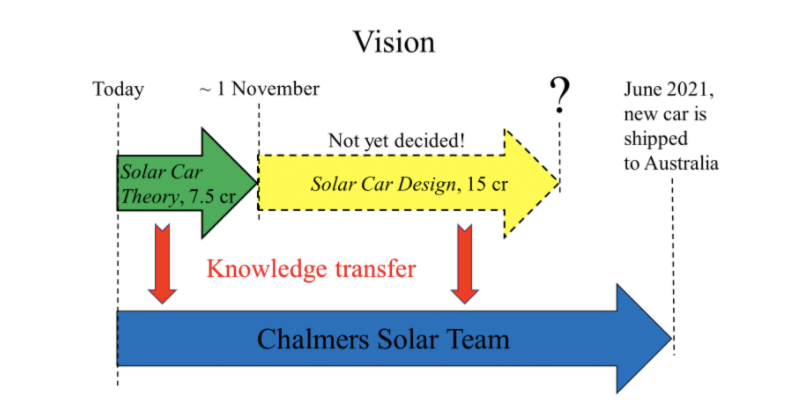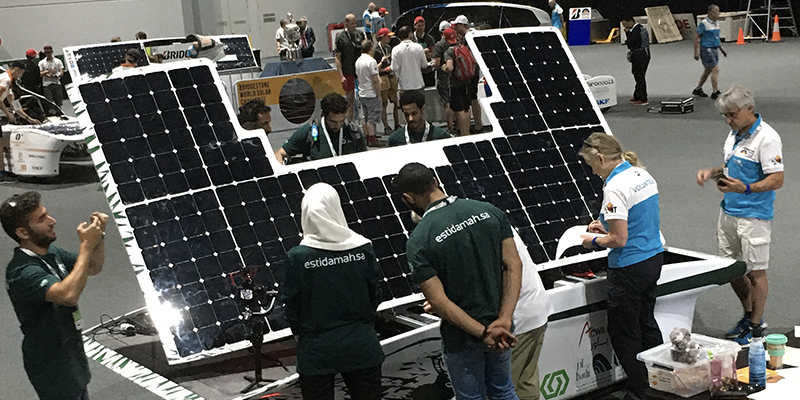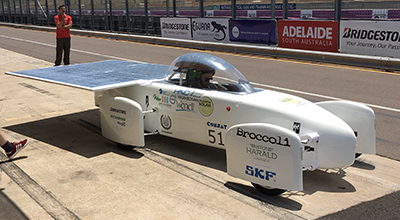The Bridgestone World Solar Challenge (https://www.worldsolarchallenge.org/) is an Australian race for solar powered vehicles which has been run for over 30 years. From the premiere in 1987, 15 races have been run, the latest in October 2019. The distance is 3000 km, from Darwin in the Northern Territory to Adelaide in South Australia. The only kind of energy permitted to propel the vehicles is solar. The race is nowadays biannual, and the next one starts on 22 October 2021. Chalmers University of Technology from Gothenburg, Sweden, a first-time contender in 2019, plans to start a new car there.
The previous Chalmers solar car project was carried out as an extracurricular student activity by the Chalmers Solar Team (CST). That will be no different in the new Chalmers project, but this time a Solar Car Theory course, see the Figure, will also be run in parallel with the project to support the CST activities.
In the course the aim is to teach and make use of Lean product development methodology and techniques with an initial focus on e.g. causal maps, SBCE, tradeoff curves, A3:s, knowledge gaps and visual planning to create useful, reusable knowledge for design purposes. The students in the course have formed specialized teams for the study of Aerodynamics and Body, Frame (chassis), Energy, Strategy and Signal Processing.

Opportunities to cooperate with industry in the course will also be explored. Several automotive companies have research, development and production facilities in and around Gothenburg, e.g. Volvo Trucks, Volvo Cars, Polestar (Volvo Car’s brand for electric cars), CEVT (China Europe Vehicle Technology) and NEVS (National Electric Vehicle Sweden, which operates the former SAAB Automobile plant).
To strengthen teaching and supervision of student projects in the Solar Car Theory course, Chalmers will also cooperate with LPPDE, which has put together a team of lecturers to supply specialist knowledge within the area of Lean Product and Process Development or more clearly spelled out: “The science of improving Innovation” and to mentor the students. Four experienced Lean Product and Process Development specialists have been chosen for this task and will support the project teaching and coaching the student teams together with the technical specialists involved.
Opportunity to bring Lean product development into university engineering education in a way that we are not aware has been tried before!
LPPDE here gets an opportunity to bring Lean product development into university engineering education in a way that we are not aware has been tried before. Lean product development is often taught to professional engineers in further education programs, but here we will be able to teach it to students who have little or no previous product development experience. Hopefully, rather than having to “reteach” seasoned engineers, with time Lean product development will be considered the natural and standard PD methodology that is taught in all engineering programs worldwide. The cooperation also permits LPPDE to invite Chalmers students to its conferences, and if the course is successful, there are plans also to write a joint paper on how LPPD has enriched and vitalized engineering education and helped the students build valuable, reusable knowledge. This is also a way for LPPDE to grow internal knowledge as the Innovation specialists come from different parts of the world and from different industries, and here we get an opportunity to build knowledge and experience together with others. There are challenges in this for the LPPDE team to discuss and learn from.
As can be seen from the Figure above, a second course, Solar Car Design, will follow if the first course is successful, and both will – besides the obvious goal of increasing the participating students’ competence – also support Chalmers Solar Team with knowledge from the above mentioned student themes.

News about last year’s World Solar Challenge on the LPPDE LinkedIn site:


